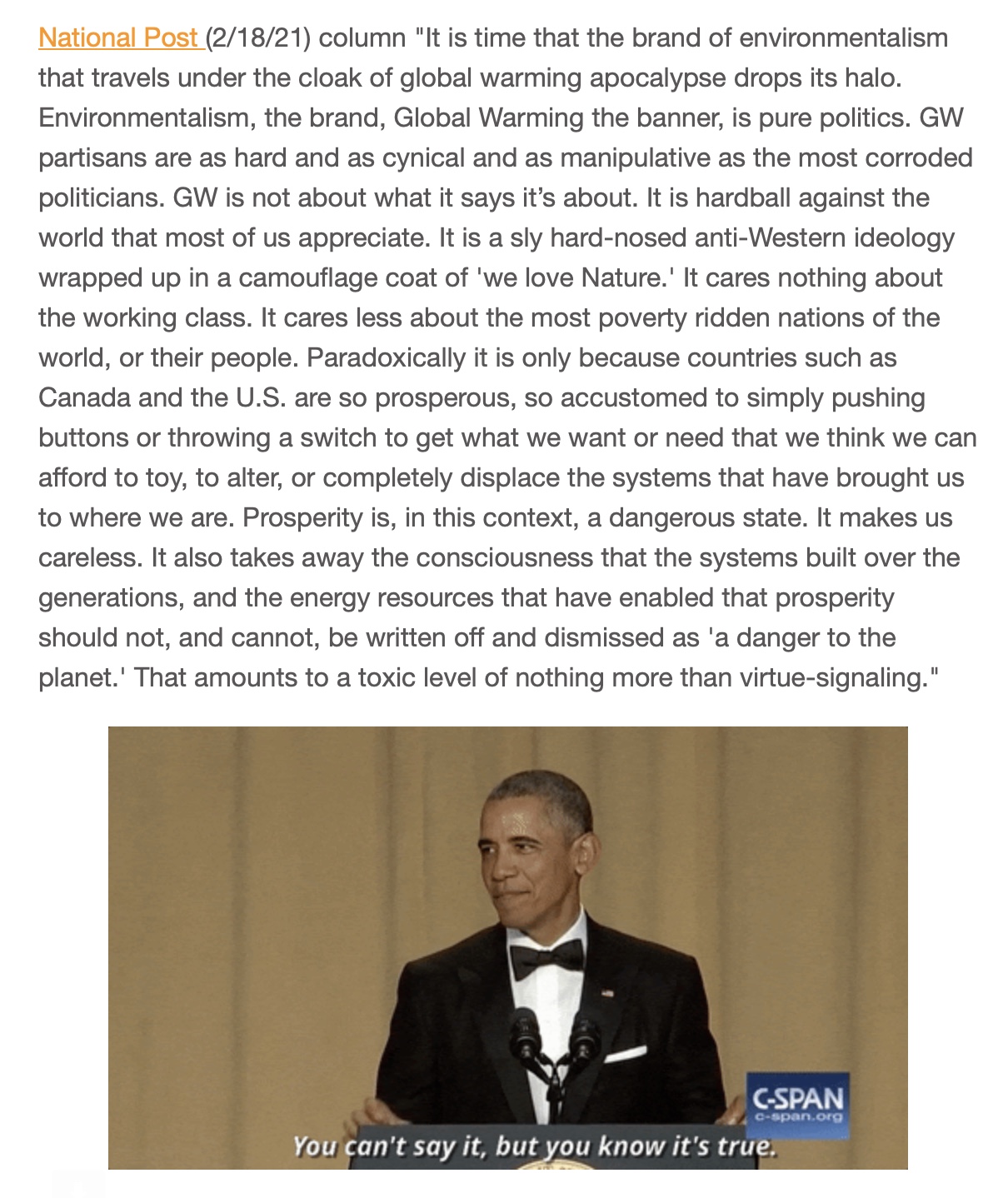GW is not about what it says it’s about. It is hardball against the world that most of us appreciate. It is a sly hard-nosed anti-Western ideology wrapped up in a camouflage coat of “we love Nature.” It cares nothing about the working class. It cares less about the most poverty ridden nations of the world, or their people.
It has been exhaling its failed and failing predictions, howling its dire warnings, and harassing everyone from school children to government officials for the near 30 years since the first Earth Summit in Rio de Janeiro in 1992. The global warming movement has absorbed into its furious alarmist narrative almost every major news outlet. It has become politically correct dogma for all progressives.
I thought we were not to have winter anymore according to the high priests of global warming. I thought snowfalls were a thing of the past, according to their acolytes in the media.
There are many examples of dire global warming predictions that have failed. The Los Angeles Times reported in 2009 on a government ecologist’s prediction that all of Montana’s glaciers would be gone in 2020. As recently as last January, Montana’s Glacier National Park was reportedly replacing signs with that very warning.
The prince of the global warming movement, Al Gore, in his Academy Award winning, An Inconvenient Truth (2006) contained the warning that “within a decade the snows would disappear from Kilimanjaro.” You can see the white snow peak any time you want in 2021. Mr. Gore has what betting enthusiasts call “form” on his predictions. In 2009 he predicted that the North Pole would be ice free during the summer in 6 years … that would be 2015. Ice — still there.
As outlined in a 2018 Wall Street Journal op/ed, NASA scientist, and one of the early leaders of global warming theory, James Hansen in 2007, predicted that most of Greenland’s ice would melt within a century. A study in Nature magazine later concluded that Hansen’s predictions would be impossible.
How long can this folly persist? Texas gets walloped. It gets smashed and battered by a huge February winter storm. The power fails. Four million people — four million! — were still without power in the world’s most modern society.
There were huge blackouts. Hundreds of thousands of households have been warned to boil water because of those blackouts. One headline from, of all places, the Weather Network, reports at least 21 deaths tied to the winter storm.
The Wall Street Journal editorialized that “Texas’s overreliance on wind power left the grid more vulnerable to bad weather. Half of the wind turbines froze last week, causing wind’s share of electricity to plunge to 8 per cent from 42 per cent … there wasn’t sufficient baseload power from coal & nuclear to support the grid.”
Most ironic of all — this was in Texas, which is the oil and gas crown jewel of the entire American republic, which has supplied the energy, more than any other state, which propelled America to become the world’s superpower.
Here let me cite a brave reporter, Lara Logan, from her Twitter board to give the flavour of the moment: “Home in Texas with no power, no heat, no water. Town is shut down — solar backups here covered in ice. Vapo Propane, one of the only places open and the lines are long…”
Propane? — is that a renewable? Didn’t think so.
Reliable power saves lives. Reliable power comes with proven technology. Reliable power comes with resources we already have.
Paradoxically it is only because countries such as Canada and the U.S. are so prosperous, so accustomed to simply pushing buttons or throwing a switch to get what we want or need that we think we can afford to toy, to alter, or completely displace the systems that have brought us to where we are.
Prosperity is, in this context, a dangerous state. It makes us careless. It also takes away the consciousness that the systems built over the generations, and the energy resources that have enabled that prosperity should not, and cannot, be written off and dismissed as “a danger to the planet.” That amounts to a toxic level of nothing more than virtue-signalling.
I naturally expect the stern rebuke that I’m confounding weather with climate. First, we never hear that when a hot summer day busts the thermometer. News agencies all go on about the hottest ever. When it’s hot and suits the message that complaint never occurs.
Secondly, I’d argue that “enough weather” if it isn’t climate is certainly on its way there, and if after 30 whole years of “carbon emissions will make the world warmer” if we keep having these marvellous counter-examples as in Texas this winter, then maybe “weather isn’t climate” is not the marvellous axiom it appears to be. More an axiom of convenience in my view.




